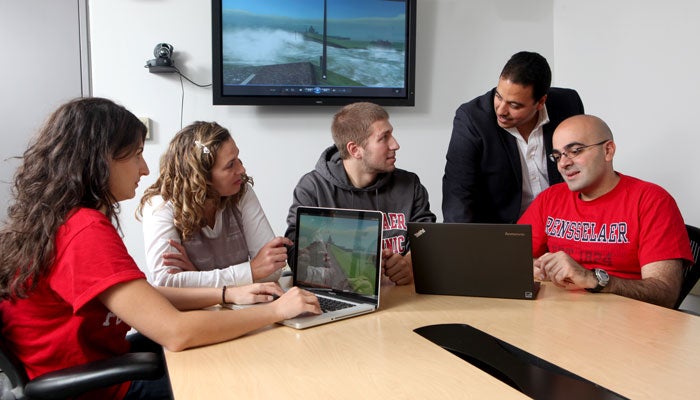
Using Web-based technology, the project enables students to work together on cutting-edge experiments using the geotechnical centrifuge at the Rensselaer Center for Earthquake Engineering Simulation.
Tarek Abdoun, the Thomas Iovino Chaired Professor in Civil and Environmental Engineering at Rensselaer Polytechnic Institute (RPI), has won the 2015 Wharton-QS Stars Reimagine Education Bronze Award for developing a Web-based module that gives students remote, real-time experience with centrifuge testing.
The global Reimagine Education awards recognize innovative pedagogy in higher education that enhances learning and employability. Abdoun and his partners from Southern Methodist University (SMU), the University of North Carolina at Charlotte (UNCC), and Broad-Based Knowledge shared the bronze award in the Engineering and IT category for “A Multi-Institutional Classroom Learning Environment for Geotechnical Engineering Education.”
Using Web-based technology, the project enables students from Rensselaer, SMU, and UNCC to work together on cutting-edge experiments using the geotechnical centrifuge at the Rensselaer Center for Earthquake Engineering Simulation. Few U.S. universities offer access to such a state-of-the-art facility.
The pilot program, which was funded by a National Science Foundation grant, is one of many examples of innovative pedagogy at Rensselaer. The Institute has long been a pioneer in mixed-reality and cyber-enabled learning and discovery, and pedagogical innovation is among the highest priorities of The Rensselaer Plan 2024, the strategic roadmap guiding the Institute as it approaches its bicentennial.
“Our teaching methods, across the curriculum, are very innovative,” said President Shirley Ann Jackson. “We originated the studio and the flipped classroom long ago at Rensselaer. Today, using advances arising out of Rensselaer research, we are even more forward-looking in our pedagogical innovations.”
Abdoun’s award-winning educational model is notable for its virtual collaborative learning. The model includes a live lecture at Rensselaer, streamed in real-time to SMU and UNCC students; assignments requiring students to design a model foundation and predict its performance under different load scenarios; and a centrifuge experiment to test those predictions.
It’s clear that students learn best when they have opportunities to integrate and apply what they’ve been taught, and innovative pedagogy provides those opportunities. We are creating environments that place students in open-ended situations, where there’s not just one answer—and where they can play, explore, and interact with others to discover a variety of solutions. These experiences make our students more comfortable with uncertainty and more willing to take intellectual risks.” —Linda Schadler
Video-conferencing technology enabled SMU and UNCC students to ask questions during the lecture and experiment. Specialized telecommunication tools made it possible for students to observe, via multiple camera angles, as the model shallow foundation was loaded into the centrifuge and pushed to failure.
“It was a unique experience for our undergraduates and the students at the other institutions,” Abdoun said. “They watched as everything they’d learned was put to the test, and they loved it.”
Shekhar Garde, dean of the School of Engineering, praised Abdoun for his contributions to world-class geotech education. “His unique approach embodies the spirit of The New Polytechnic, a new paradigm for teaching, learning, and research at Rensselaer,” Garde said. “World-class research potentiates education in Dr. Abdoun’s laboratory. We congratulate him on this well-deserved, prestigious award.”
The foundation of The New Polytechnic is the recognition that global challenges and opportunities are so great that they cannot be addressed by the most talented person working alone. The New Polytechnic enables collaboration using the latest, most advanced tools, technologies, and approaches to address the complex problems of the world, such as modeling geotechnical engineering.
Abdoun also is playing a key role—along with Victoria Bennett, assistant professor of civil and environmental engineering—in developing Geo Explorer, a mixed-reality mobile game that will allow engineering students to inspect, design, and test flood protection systems virtually.

Abdoun also is playing a key role—along with Victoria Bennett, assistant professor of civil and environmental engineering—in developing Geo Explorer, a mixed-reality mobile game that will allow engineering students to inspect, design, and test flood protection systems virtually.
The emphasis on innovative teaching affects Rensselaer students at every level and in virtually every discipline. Incoming freshmen benefit from the Bridge Scholars Program, which combines on-campus instruction and mentoring with online coursework and feedback. When piloted in 2014, the program focused exclusively on calculus. A physics component, including remote labs, will be added this summer.
The Mandarin Project, developed by researchers in the School of Humanities, Arts, and Social Sciences, uses immersive technology to deliver lessons on the Mandarin Chinese language and Chinese culture. A new multidisciplinary initiative, Art_X @ Rensselaer, helps students experience and understand the connections between the visual arts, architecture, science, and engineering. Art_X teaches students to consider the science in, and of, art and the art in, and of, science.
At the graduate level, innovative pedagogy enables working professionals to take advantage of blended learning approaches—online, in the classroom, and in laboratories—to earn certificates and advanced degrees. Through the Advanced Professional Studies program, working professionals can take part in part-time master’s degree programs with the same rigorous course work as full-time students— and earn the same highly respected degree.
“It’s clear that students learn best when they have opportunities to integrate and apply what they’ve been taught, and innovative pedagogy provides those opportunities,” said Linda Schadler, vice provost and dean for undergraduate education. “We are creating environments that place students in open-ended situations, where there’s not just one answer—and where they can play, explore, and interact with others to discover a variety of solutions. These experiences make our students more comfortable with uncertainty and more willing to take intellectual risks.”
“We don’t want our graduates to simply regurgitate information,” she added. “We want graduates who go out there and innovate and contribute.


